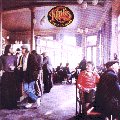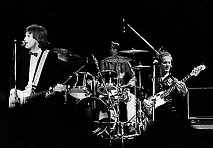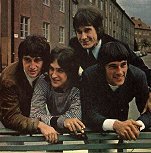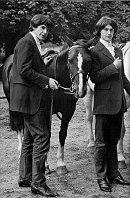Take Me Back To Those Black Hills That I Ain't Never Seen
THE KINKS INVENT ALTERNATIVE-KOUNTRY
By: Gary Pig Gold

 "MUSWELL HILLBILLIES isn't just a better country-rock album than anything by Wilco or Son Volt; It's a better country-rock album than anything by The Byrds."
"MUSWELL HILLBILLIES isn't just a better country-rock album than anything by Wilco or Son Volt; It's a better country-rock album than anything by The Byrds." When the esteemed J.R.Taylor first wrote this in "The New York Press" awhile back, I couldn't help but laugh. J.R.'s always tossing around outrageous statements like this, and obviously loves a good scrape as much as anyone else who chooses to live -- or write -- within the confines of New York City.
 But then just the other day, my so-long-suffering better-half brought home Velvel Records' shiny new re-issue of the 1971 Kinks klassic in question day, and I'm certainly not laughing anymore.
But then just the other day, my so-long-suffering better-half brought home Velvel Records' shiny new re-issue of the 1971 Kinks klassic in question day, and I'm certainly not laughing anymore.
Without naming any more names (and believe me, I could greatly expand on Mr.Taylor's little list!), let's just say that one has to at least question the musical, and perhaps even socio-geographic, pedigree behind most of what's today being loosely labeled "alt.country": To whit, Strip the vast majority of [insert your current fave raves from the genre here] straight down, or better still see and hear [ditto] live on stage some night, and you're likely to recognize, should you really be hip-honest enough, little more than just some plain dumb ol' r-a-w-k in the USA with a couple of B-benders and sparkly shirts (if you're lucky) tossed on top. The Stones and even the Georgia Satellites, fer G's sake, have done it all already all over and over again and with quite a bit more spit and panache, truth be told. And let's not even get started with Rank And File, OK?!
 Cut to: Dry ice and lens balm.
Cut to: Dry ice and lens balm.
Setting the Way Back machine for November of 1971, the freshly-revitalized Kinks have just signed a new recording contract in the wake of their worldwide smash "Lola." Yet who on Earth would have ever expected the band would -- or could -- deliver such an understated li'l gem as the Muswell Hillbillies album for their debut platter on none other than Elvis' label? Defiantly out-of-step in its time (like all the best music, the Kinks' especially, seems to be), Muswell remains remarkable today not only for its sound ("acoustic ragtime," I've heard it called), but for its weird and utterly wunnerful -- not to mention downright clairvoyant -- under-current of suspicion, betrayal, paranoia and, yep, all-purpose government plots. "The Ex-Files"? Hah! MH is literally dripping with deceit, deception, and konspiracies of each and every stripe, primarily set against the seedy backdrop of post-World War 2 Britain. It was in those dank times that the less fortunate amongst inner-city London's bombing victims were being coldly up-ended and up-rooted into the equally bleak (government-approved) "new-towns" rapidly springing like weeds atop once-quaint suburbs. Not coincidentally, most each and every actual Kink spent their ignoble childhoods amidst such prefab rabble (for more utterly chilling tales, check out Ray Davies' unauthorized autobiography "X-Ray"). Pedigree in spades, in other words.
 Many of Muswell's best songs address -- more like CONFRONT -- this sad, sorry state of affairs ("Here Come The People In Grey," "Acute Schizophrenia Paranoia Blues") and how the once-proud victims attempt to cope with their sordid new lives and neighborhoods ("Alcohol," and the early ode to anorexia "Skin & Bone"). Like some bleak, David Lynch-directed spin on their televised namesakes the Clampetts, Muswells' songs talk of a REAL social revolution -- namely the enforced displacement of families and the resultant choking of cultures and ideals -- as opposed to the more globally innocuous, mere Top 40 sloganeering of "Street Fighting Man" or that "Hey Jude" B-side then so en vogue. But really, Ray and his Kinks have always had a soft spot for society's down-trodden, abused misfits: they were just far too honest and pointed in their examinations of same to score many hit records in the process.
Many of Muswell's best songs address -- more like CONFRONT -- this sad, sorry state of affairs ("Here Come The People In Grey," "Acute Schizophrenia Paranoia Blues") and how the once-proud victims attempt to cope with their sordid new lives and neighborhoods ("Alcohol," and the early ode to anorexia "Skin & Bone"). Like some bleak, David Lynch-directed spin on their televised namesakes the Clampetts, Muswells' songs talk of a REAL social revolution -- namely the enforced displacement of families and the resultant choking of cultures and ideals -- as opposed to the more globally innocuous, mere Top 40 sloganeering of "Street Fighting Man" or that "Hey Jude" B-side then so en vogue. But really, Ray and his Kinks have always had a soft spot for society's down-trodden, abused misfits: they were just far too honest and pointed in their examinations of same to score many hit records in the process.
And as for the MUSIC on Muswell Hillbillies, well! The panoramic cover shot of five hairy goofs propped up in some corner pub offers the first clue towards the treasures enclosed: It is in fact a snap of Our Heroes in the smoky interior of the Archway Tavern, where Ray and his family used to spend their Thursday nights listening to "the worst country and western band in the world," Davies recalls (who, it turns out, were from Ireland. An early U2 encounter, perhaps?) Indeed, the first sound you hear on the album is the gentle strumblings of an acoustic guitar -- teasingly like their aforementioned "Lola" monster. However, song number one, "20th Century Man," soon grows (via a possibly ironic R. McGuinn-y bridge section) into a delicately-layered, full-on stomp upon the terrors of far "too much aggravation" out on "the edge of insanity" (as the at times barely audible vocals screech). Welcome to the REAL jungle, Apeman!
 Ray's brother/foil/lead-guitarist-extraordinaire Dave picks up the tale: " Muswell is a really strange record, because it's so rooted in our London backgrounds, yet it has all the emotional elements, and a lot of the instrumentation, of American blues." Sure enough, "Holloway Jail," for one, would provide an ideal candidate for the esteemed Mr. J. Cash's very next opus. (Listening, Mr. Rubin? Just don't invite Tom Petty to accompany this time though!) It was at this precise moment that the original Kinks guitar-keys-drums line-up was first augmented by brass and woodwinds but, most thankfully, NOT in the same quasi-Memphian fashion as those Stones and other assorted Mad Frogs and Englishmen. No, Ray just set up an extra mic in the bathroom, hired three players to approximate the desperately liquid New Orleans horn stylings of the Twenties and Thirties, and deftly turned "Alcohol" and "A.S.P. Blues" into slippery, slidey blues-ups of the lowest odor (imagine, if you dare, Dr. John directing Side One of Blonde On Blonde). But then, just when you're ready to slit your eardrums over the inevitable cacophony of despair and perfectly bum notes which abound, a shimmering beauty like "Oklahoma USA" comes drifting through the underbrush, proving -- as if any more evidence were needed -- that Raymond Douglas Davies is without a single doubt one of r'n'r's absolutely supreme melodists ever. Hmmm. Can you say "lost art"?
Ray's brother/foil/lead-guitarist-extraordinaire Dave picks up the tale: " Muswell is a really strange record, because it's so rooted in our London backgrounds, yet it has all the emotional elements, and a lot of the instrumentation, of American blues." Sure enough, "Holloway Jail," for one, would provide an ideal candidate for the esteemed Mr. J. Cash's very next opus. (Listening, Mr. Rubin? Just don't invite Tom Petty to accompany this time though!) It was at this precise moment that the original Kinks guitar-keys-drums line-up was first augmented by brass and woodwinds but, most thankfully, NOT in the same quasi-Memphian fashion as those Stones and other assorted Mad Frogs and Englishmen. No, Ray just set up an extra mic in the bathroom, hired three players to approximate the desperately liquid New Orleans horn stylings of the Twenties and Thirties, and deftly turned "Alcohol" and "A.S.P. Blues" into slippery, slidey blues-ups of the lowest odor (imagine, if you dare, Dr. John directing Side One of Blonde On Blonde). But then, just when you're ready to slit your eardrums over the inevitable cacophony of despair and perfectly bum notes which abound, a shimmering beauty like "Oklahoma USA" comes drifting through the underbrush, proving -- as if any more evidence were needed -- that Raymond Douglas Davies is without a single doubt one of r'n'r's absolutely supreme melodists ever. Hmmm. Can you say "lost art"?
With all that said, must I really now admit I haven't truly heard a peep that comes remotely close to approaching the lyrical, musical, and dare I say it emotional depth of Muswell Hillbillies in most every alterna-twang twung over the past quarter century or so? I thought not. Sure, most of today's biggest and loudest practitioners of insurgentsia may all duly own and apparently cherish their factory re-issues of Sweetheart Of The Rodeo and Hank Senior's 40 Greatest Hits, but most everyone else toiling in this particular musical tarpit at the moment, not to mention each and every single one of you out there reading this right now, should without a doubt add AT LEAST this one Kinks record to their kollection pronto: Life, as Ray sings herein, may very well be over-rated, but Muswell Hillbillies most certainly is NOT. Right, J.R.?

